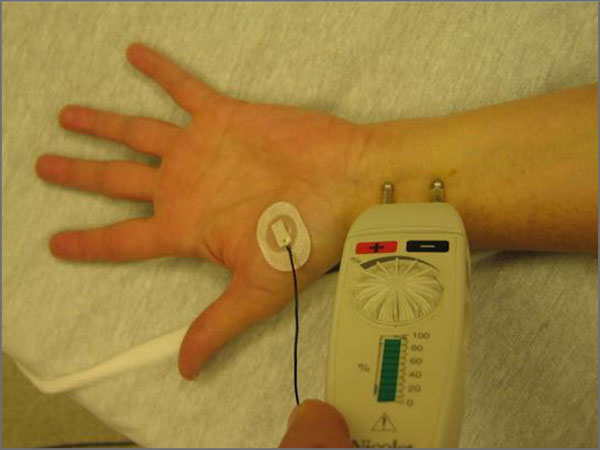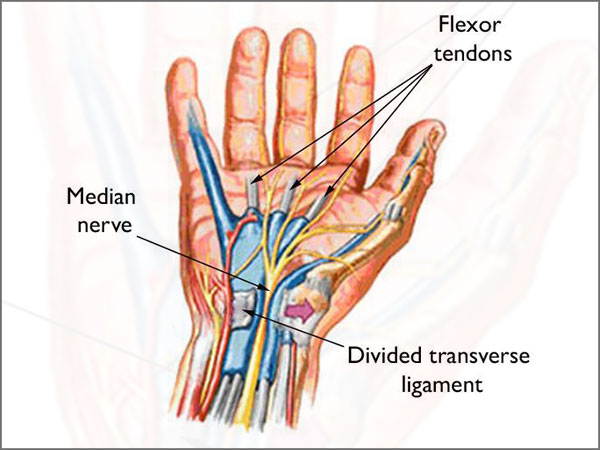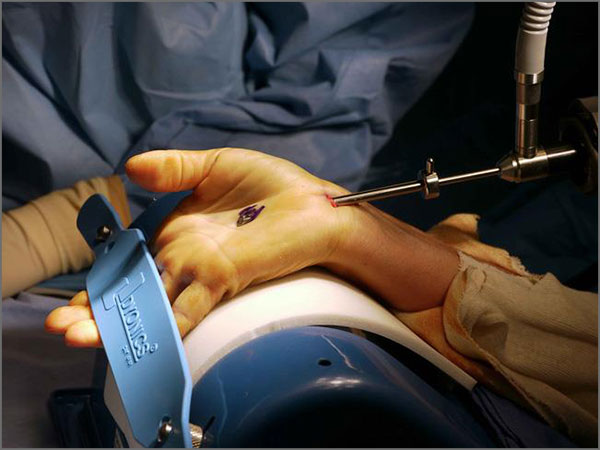- What is carpal tunnel syndrome?
The syndrome of compression over the nerve supplying the hand (median nerve) at ones wrist is called carpal tunnel syndrome. - Who are prone to carpal tunnel syndrome?
Females who are obese are more prone for CTS. Patients with suboptimal function of thyroid gland (hypothyroidism) are also more affected. Diabetes is another risk factor. - What are the main symptoms of carpal tunnel syndrome?
Patients with CTS present with pain in hands associated with tingling and numbness. All these symptoms are present more in the nights. Patients are forced to wriggle their wrists and fingers to get relief from symptoms. In long standing cases there will be wasting and atrophy of the muscles of the hand.

- How is carpal tunnel syndrome diagnosed?
A clinical suspicion, proper history and a detailed neurological examination are mandatory. Once the diagnosis is made it needs to be confirmed by an investigation called nerve conduction study. Here the nerve is stimulated and the speed in which the impulses are conducted are recorded. In CTS the velocity of nerve conduction is markedly reduced. - Can carpal tunnel syndrome be prevented?
Normally CTS is seen in individuals who do repetitive work, like packaging industry and in house wives who do lot of domestic chores. Proper esthetics in using the wrists can prevent CTS. Ergonomics in using the hand while writing or operating a mouse all play a part in preventing CTS. - What are the different modalities of treatment for carpal tunnel syndrome?
Proper rest to the hand with adequate splinting of the wrist is the first step in the management. Diuretics and anti inflammatory drugs will reduce the pressure on the nerve. Some times one can try steroid injections at the painful site over the wrist, followed by splints. If all these measures fail then one has to consider surgery. At surgery the median nerve at the wrist is adequately decompressed. - Is surgery the only modality of treatment for carpal tunnel syndrome?
As mentioned earlier surgery is one of the modalities. Majority of individuals with CTS can be treated with rest and appropriate medication. Proper splinting of wrist during work can also be tried. As mentioned earlier surgery is the last option and to be tried when conservative measures fail. - What types of surgeries are there for carpal tunnel syndrome?
There are 2 types of surgeries. One is the traditional open surgery, which results in a significant scar across the wrist. The pressure over the median nerve is released by cutting a tough ligament called flexor retinaculum. The wound takes at least 10 days to heal and the patient needs at least 2 weeks to start her daily routine. In another method the nerve is decompressed through a very small opening using an endoscope. Here the scar is very minimal and patient gets back to work in less than 5 days.
 |
 |
- What precautions does one need to take after surgery for carpal tunnel syndrome?
As such there are n definite precautions for patients who undergo surgery for CTS. Associated conditions like hypothyroidism and diabetes should be controlled accordingly. - Does carpal tunnel syndrome run in families?
No. CTS does not run in families.


